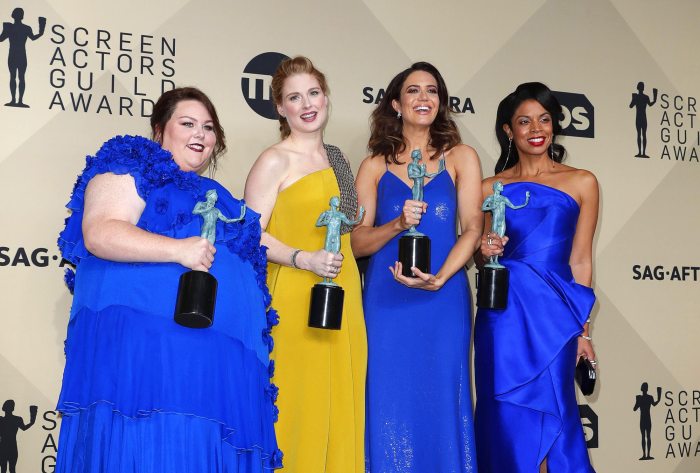
Mandy Moore. MediaPunch/Shutterstock
Mandy Moore may be a family title, however that doesn’t imply she’s making a ton of cash when followers stream her previous work.
“The residual issue is a huge issue,” Moore, 39, instructed The Hollywood Reporter on Tuesday, July 18, whereas becoming a member of the Disney picket line in Burbank, California, in assist of the SAG-AFTRA strike. “We’re in incredibly fortunate positions as working actors having been on shows that found tremendous success in one way or another … but many actors in our position for years before us were able to live off of residuals or at least pay their bills.”
The This Is Us alum — who performed Rebecca Pearson on the NBC drama from 2016 to 2022 — revealed that she acquired “very tiny, like, 81-cent checks” from the streaming residuals for the Emmy-winning collection.

Chrissy Metz, Alexandra Breckenridge, Mandy Moore and Susan Kelechi Watson. Mike Nelson/EPA-EFE/Shutterstock
“I was talking with my business manager who said he’s received a residual for a penny and two pennies,” Moore instructed the outlet.
In May 2017, Hulu acquired the streaming rights for This Is Us, beating out Netflix and Amazon. Hulu has since had co-exclusive rights to any digital rollout of the drama together with NBC, which is the place the present initially aired.
The present SAG-AFTRA strike — which comes amid the Writer’s Guild of America (WGA) strike — is concentrated partly on getting actors truthful wages, transparency for streaming residuals and pointers for using synthetic intelligence in media.
SAG president, Fran Drescher, confirmed on Thursday, July 13, that the union, which is made up of greater than 160,000 TV and film stars, can be placing alongside WGA, which started its name for motion in May.
“It’s a very serious thing that impacts thousands, if not millions of people all across this country and around the world,” Drescher, 65, stated in a press convention after the Alliance of Motion Picture and Television Producers (AMPTP) didn’t comply with any of the union’s phrases. “Not only members of this union but people who work in other industries that service the people that work in this industry. … We had no choice. We are the victims here. We are being victimized by a very greedy entity.”
During the strike, unionized actors are forbidden to movie any struck tasks and usually are not allowed to advertise their work, together with previous, current or future exhibits and movies.
Moore, for her half, was one of many many actors who joined the crowds on day one of many strike on Friday, July 14. She was surrounded by This Is Us friends Chrissy Metz and Jon Huertas.
“My forever family,” Moore captioned an image together with her former castmates through her Instagram Story on Friday. They all held indicators in assist of the trigger.
While Moore’s story of small streaming residuals could shock followers, she’s not the one actor who’s been vocal about the issue.
Gilmore Girls alum Sean Gunn, for instance, instructed THR on Friday that he “wanted to come out and protest Netflix” as a result of the WB collection has “brought in massive profits for Netflix” and that cash has not trickled all the way down to the unique forged.
After Gunn’s preliminary interview with the outlet was taken down, he clarified his remarks through Twitter.
“I did an interview from the picket line at Netflix yesterday for The Hollywood Reporter, and they took that interview down because apparently I didn’t note that my residuals aren’t paid by Netflix, but they’re actually paid by the production company, Warner Bros.,” Gunn, 49, stated on Saturday, July 15.
The actor — who performed Kirk for all seven seasons of Gilmore Girls and its subsequent Netflix revival, Gilmore Girls: A Year within the Life — identified that the blame nonetheless lands on streaming websites comparable to Netflix.
Sign up for Us Weekly’s free, day by day e-newsletter and by no means miss breaking information or unique tales about your favourite celebrities, TV exhibits and extra!
“The important thing is that the whole point of my interview is that Netflix doesn’t pay residuals to the actors, so there’s no sharing in the success of a show with Netflix. It’s true that they pay a licensing fee to Warner Bros. and that Warner Bros. then pays residuals from that licensing fee, which is a very small amount, particularly for a show that’s been off the air for a long time,” Gunn continued. “But when the show is a huge success, and they generate millions of dollars in profits for Netflix, we don’t share in any of that, in large part because there’s no transparency with their numbers. But really, this is about fairness for everybody. We just want to make sure we have a fair deal. If a show’s a success, we should participate in that. That seems totally reasonable.”








Discussion about this post